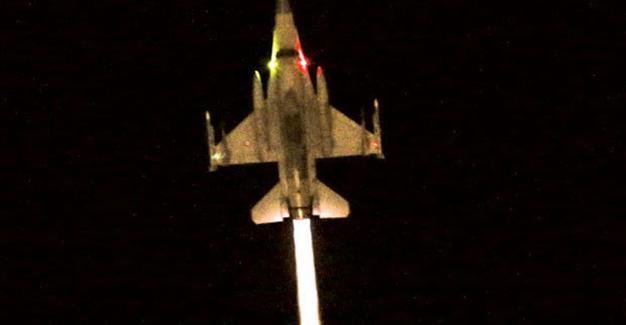I hit the presidential palace on purpose as part of coup, says Gülen follower pilot
ANKARA

The pilot who hit the Presidential Palace in Ankara during the July 15 failed coup has said that he hit the building on purpose as part of the coup, making him one of the first soldiers to admit that he acted knowing that there was a putsch against the country’s elected government.
“I knew that we, I mean the Gülen movement, was staging a coup. I hit the building on purpose,” pilot Müslim Macit said in his testimony, which was taken on Sept. 30.
The followers of U.S.-based Islamic preacher Fethullah Gülen are accused of staging the attempted putsch.
Soldiers identified as Cpt. Mete Kaygusuz, Cpt. Ahmet Tosun and Col. Ahmet Özçetin were at a table on the night of the coup, Macit said, adding that Özçetin was taking orders from civilians that he did not know.
“Hakan Evrim, Kubilay Selçuk and civilians that I don’t know were in the military area,” said Macit.
“Tosun conveyed the orders that he took from Mehmet Fatih Çavur via a walkie-talkie to the plane. Çavur was taking orders from Ahmet Özçetin. Tosun started telling the planes that there was permission to hit the parliament, fly at a low altitude over Kızılay, that there was permission to hit Türksat [Turkey’s top satellite network] and fly low over the General Staff,” he said.
During his testimony, Macit said he had known that the commander of Air Force Gen. Abidin Ünal was brought to the 141st fleet at the Akıncılar Air Base, one of the centers of the coup, but that his hands were not tied.
“He said good evening to us and walked away,” Macit said.
Macit also described how he hit the Presidential Palace during the coup attempt.
“I hit the Presidential Palace and the mosque near it. I dropped a bomb near the mosque. Later on the planes that took off from [the eastern province of] Erzurum came to stop me. Upon that, I returned to the base. At that time I knew that we were attempting a coup,” he said.
Meanwhile, 40 soldiers from an air base in the Central Anatolian province of Konya were detained as part of the investigations into July’s failed military coup attempt.
Detention warrants had been issued for a total of 47 soldiers from Konya in what was the third wave of action against suspected followers of Gülen.
More than 32,000 people are in jail and 100,000, including top military figures, have been dismissed from jobs in the security and civil service for their suspected links to the Gülenists.
Separately, the suspected software developer of the smartphone app ByLock, a messaging application that is said to have been used by the coup plotters for concealed conversations, was sent to court with the prosecutor seeking his arrest. The developer, identified only as İhsan T., was a former employee of the Scientific and Technological Research Council of Turkey (TÜBİTAK) and an alleged member of the Gülenist movement.
He was sent to the courthouse in Istanbul’s Çağlayan as part of the probe conducted by the Istanbul Chief Public Prosecutor’s Office’s Terror and Organized Crime Bureau.
He is charged with “being a member of an armed terrorist group,” according to Anadolu Agency.
Elsewhere, Deputy Prime Minister Nurettin Canikli has said the next state of emergency decree will be issued in a short period of time.
“The new state of emergency decrees will be issued. We are preparing another fresh state of emergency decree. New regulations regarding intelligence are on the table, but we don’t know if it will be ready for this state of emergency decree. There will be some who return to their jobs with the new decree,” Canikli told Turkish broadcaster Habertürk on Oct. 20.
Thousands of people have been suspended from their duties since the failed coup bid, after which a state of emergency was declared.
 The pilot who hit the Presidential Palace in Ankara during the July 15 failed coup has said that he hit the building on purpose as part of the coup, making him one of the first soldiers to admit that he acted knowing that there was a putsch against the country’s elected government.
The pilot who hit the Presidential Palace in Ankara during the July 15 failed coup has said that he hit the building on purpose as part of the coup, making him one of the first soldiers to admit that he acted knowing that there was a putsch against the country’s elected government.